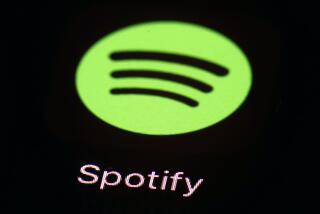Apple Music announced, with on-demand streaming, Beats 1 radio
- Share via
Apple officially announced its much-anticipated streaming service, Apple Music, that will take on the likes of Spotify and Pandora.
The new Apple music app includes on-demand streaming similar to Spotify and a 24-hour live radio station called Beats 1, the company’s executives said at its developer conference in San Francisco on Monday.
Apple Music launches in 100 countries June 30 for iPhone, iPod and iPod Touch devices, followed by Windows and Android devices in the fall.
As expected, the Cupertino tech giant said its on-demand streaming service will cost the industry standard of $9.99 a month, with a free trial of three months. Apple also will offer a family plan that allows six people to share a $14.99 a month subscription.
“Apple Music is all the ways you love music, all in one place,” said iTunes head Eddy Cue while introducing the service.
The on-demand feature will make personalized music recommendations based on users’ tastes. Users will also be able to use the voice command app Siri to ask for music by saying “Play ‘Born to Run’” or “Play the top song from May, 1982.” Subscribers also will keep access to their iTunes libraries.
Nonsubscribers still will be able to listen to Beats 1, which features DJs such as Zane Lowe, with interviews and news.
Apple also unvieled a feature called Connect that allows artists, even unsigned ones, to upload new music, videos and other materials in order to reach fans.
“The idea of connecting with an artist has never been closer and reachable than right now,” said hip-hop star Drake during the conference.
The announcement comes less than a year after Apple completed its purchase of Beats, founded by moguls Jimmy Iovine and Dr. Dre, for $3 billion.
The music industry is looking to streaming to make up for the decline in digital download sales and the collapse of the CD market. Downloads fell 8% worldwide in 2014, according to the International Federation of the Phonographic Industry. Meanwhile, the IFPI reported revenue from subscriptions is growing fast — up 39% last year.
There’s plenty of room to grow, analysts say. Subscriptions accounted for $1.6 billion in revenues in 2014, accounting for about 11% of total global sales for the music industry. In the U.S., the Recording Industry Assn. of America says 7.7 million people pay for a subscription.
Record labels hope the new service will mean more pay. Executives have been pushing against the “freemium” on-demand streaming model, where users can get virtually unlimited access to songs in exchange for hearing ads. Royalties from subscriptions are higher than those from ad-supported listening.
Sony Music Entertainment chief executive Doug Morris confirmed Sunday that the Apple announcement was coming, saying in onstage remarks at the Midem conference that Apple’s venture could be a “tipping point” in the shift to streaming.
“What does Apple bring to this?” Morris said, according to VentureBeat. “Well, they’ve got $178 billion dollars in the bank. And they have 800 million credit cards in iTunes. Spotify has never really advertised because it’s never been profitable. My guess is that Apple will promote this like crazy, and I think that will have a halo effect on the streaming business.”
Apple is going up against some entrenched players. Spotify, based in Stockholm, has 60 million users, 15 million of whom pay a subscription. Pandora has 79.2 million monthly users, the vast majority of whom listen for free.
Others have tried to make their mark, with limited success. YouTube’s Music Key service is still in beta testing after its debut late last year. Tidal, which rapper Jay Z bought for $56 million, became mired in a public relations nightmare shortly after its launch at a fumbled, star-studded news conference.
Apple previously entered the streaming space in 2013 with the launch of iTunes Radio, but it failed to put much of a dent in Pandora’s business. Ahead of Monday’s launch, Pandora founder Tim Westergren said the first iTunes Radio launch resulted in a 2% decrease in active listeners.
“Moreover, the decrease was short-lived, our listener hours actually grew that month and we finished the year with strong double-digit increases in both active listeners and hours,” Westergren said.
Follow Ryan Faughnder on Twitter for more entertainment business coverage: @rfaughnder
More to Read
From the Oscars to the Emmys.
Get the Envelope newsletter for exclusive awards season coverage, behind-the-scenes stories from the Envelope podcast and columnist Glenn Whipp’s must-read analysis.
You may occasionally receive promotional content from the Los Angeles Times.











